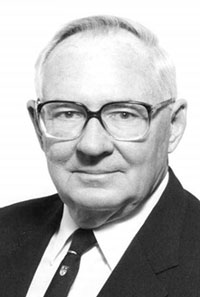Fellowship History
 Background
Background
Stanley F. Patten Jr., M.D., Ph.D., F.I.A.C. (1924—1997) was known for being a gifted teacher, scientist and extraordinary diagnostic pathologist. His passion for cytology enhanced the core values of our division: patient care, education, and research. He insisted on excellence, was fully dedicated to patient care and contributed to the lives and careers of others as a friend and mentor. His interest in medicine and pathology started while he was a Medical Administrative Corps Officer during the Second World War. It was 1963 when Dr. Patten was recruited to the University of Rochester Medical Center and quickly changed the Cytology Laboratory to become one of the largest and best known academic cytopathology laboratories in the nation.
The department enjoyed year-long fellows beginning in the late 1970’s and early 1980's. In 1989, after the American Board of Pathology established cytopathology as a subspecialty certified by the board, a formal cytopathology fellowship was established at the University of Rochester Medical Center. The program was among the first approved and fellows have been trained here ever since. Dr. Patten’s extensive career resulted in numerous contributions to the field of cytopathology, including many that continue to impact the field today. It is hoped that those chosen for this fellowship will follow in the footsteps of Dr. Patten and contribute to the field through the daily practice of our values, contributing to improve the lives of those encountered along the way.
Today’s Stanley F. Patten Cytopathology Fellowship is a one-year ACGME-accredited fellowship offering advanced training in diagnostic cytopathology. Fellows are trained to practice personalized medicine through a multidisciplinary approach to the cases. The fellow performs fine-needle aspirations of superficial lesions, several by ultrasound guidance, and assists most fine needle aspirations of deep-seated organs. In addition, we have available various ancillary techniques such as immunocytochemistry, flow cytometry, and various molecular studies, including next generation sequencing, for cytologic specimens. Considerable emphasis is placed on correlations between cytopathologic and surgical pathologic diagnoses and the fellow is expected to be involved in publications and academic activities related to cytopathology.